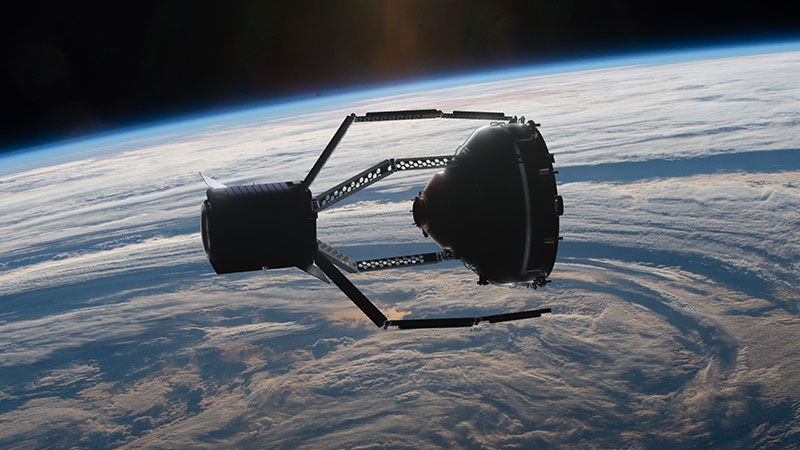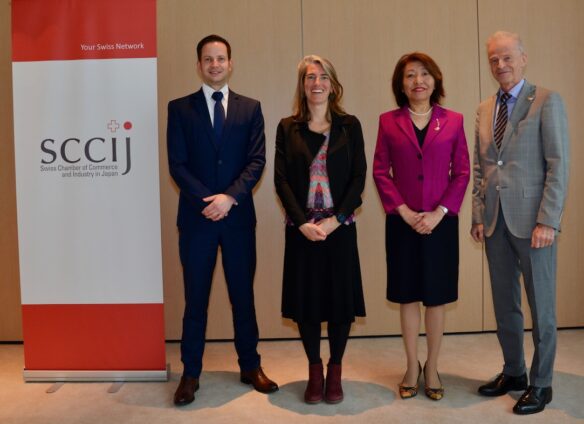Tokyo (SCCIJ) – The Swiss start-up ClearSpace will carry out the first European mission to remove space debris in orbit. The young company from the canton Vaud spun off the Swiss Federal Institute of Technology Lausanne (EPFL) in 2018 recently signed a service contract worth 86 million euros with the European Space Agency (ESA). The mission will start in 2025.

The ClearSpace-developed removal unit is designed to approach a piece of space scrap, capture it with its robotic arms and place it in a very low orbit (© ESA).
Ambitious project
The Swiss start-up was selected out of twelve other candidates to develop ClearSpace-1, the most ambitious international project to remove space debris from orbit. ClearSpace-1 is part of ESA’s ADRIOS program to develop in-orbit services for satellites such as refueling, repairs, and orbital maneuvers. Its mission is to develop a robot-like spacecraft with four articulated arms which will ultimately enable space debris to be removed safely.
ClearSpace-1’s first task scheduled for 2025 after launching from the Kourou space center in French Guiana, will be to bring down the Vespa (Vega Secondary Payload Adapter) left by the Vega rocket placed in orbit in 2013, the size of a 112 kg satellite. With its arms, the robot will remove Vespa and place it so close to the earth’s atmosphere that it will burn up and disintegrate.
The Swiss start-up will need to draw on its network of sponsors and contributors to help fund this 14-million-euro project, representing 14% of the total project cost which stands at circa 100 million euros. This investment will create high added-value employment locally and launch a new in-orbit cleaning market which is set to thrive in the years to come. “ESA and us share the same clear vision of safer, more sustainable space for all,” says Luc Piguet, co-founder and CEO of the start-up.
European approach
ClearSpace is in charge of Research & Development, designing and building the spacecraft with the help of its industry partners: Deimos Portugal and UK will be responsible for the navigation and guidance systems. Airbus in Germany will be in charge of avionic assembly. OHB-Sweden will design and manufacture the propulsion system. APCO-Technologies in Switzerland will offer its expertise in satellite structure and thermal control.
A group of Swiss industry sponsors including RUAG Space, Syderal Swiss Micro-Cameras & Space Exploration, and nanoSPACE will also contribute to the project in their respective fields. They will be joined by cutting-edge space industry researchers and academics from EPFL, the Vaud School of Management and Engineering and the University of Bern Astronomy Institute.
Rising amount of debris
“Space debris and our current use of space, especially in low earth orbit, is a growing risk for both manned spacecraft and operational satellites. The time for action is now. It will no longer be acceptable in the future to leave upper stages of launchers in orbit, and those already in orbit today should be eliminated as far as possible,” says Claude Nicollier, ESA/NASA astronaut and Chairman of ClearSpace’s advisory board.
“The way space has been used until now has led to a situation where over 5,000 satellites and out-of-control rocket stages are in orbit compared to only 2,700 working satellites. In-orbit services are not only a natural part of future space operations, they will also ensure the development of a thriving space economy,” adds ClearSpace CEO Piguet.
Over the past ten years, the number of satellites launched every year has increased tenfold to over 600 a year. At the same time, the rising amount of debris in space is a growing threat to the future and safety of space activity. Over 23,000 items of debris are closely tracked.
Text: Martin Fritz for SCCIJ, based on material of ClearSpace





























